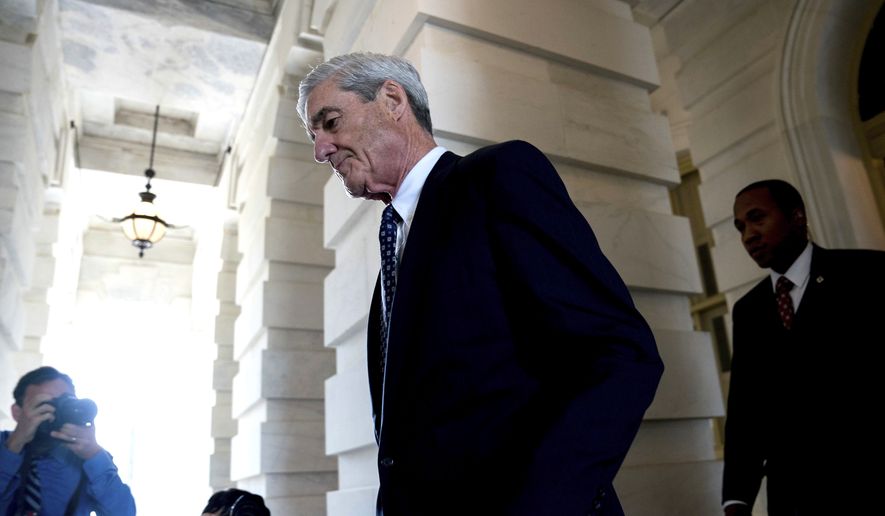The 13 Russian social media “troll factory” operatives charged last week with meddling in the 2016 U.S. presidential election should fear for their freedom should they ever set foot beyond the borders of Russia, security analysts said this week.
While Russian officials have condemned both the charges and the probe, the caution underscores special counsel Robert Mueller’s ability to make his authority felt even against those far beyond the reach of U.S. law enforcement agencies.
“While those indicted aren’t likely to see a U.S. courtroom anytime soon and most likely never at all, they will be limited in their travel as they avoid any country that has an extradition treaty with the U.S. or somewhere the U.S. can grab them,” Boris Zilberman, a Russia analyst at the Foundation for Defense of Democracies, said in an interview.
The 37-page indictment filed last Friday by Mr. Mueller detailed the Kremlin’s multiyear “Project Lakhta” which U.S. investigators contend was launched to wage “information warfare against the United States of America” by sowing divisions across society through a campaign of social media sabotage.
Some in the probe already have been targeted — Project Lakhta’s alleged mastermind, Putin confidant Evgeny Prigozhin, already faces major international financial sanctions for his suspected role in Russian aggression in Ukraine.
The defendants, in addition to three entities, have been charged with conspiracy to defraud the U.S. by impairing enforcement of election law, conspiracy to commit wire and bank fraud and multiple counts of identity theft.
Separately, court records indicate at least one new charge has been filed under seal in the case against President Trump’s former campaign chairman.
The filing indicates a sealed document was entered in case of Paul Manafort, who already faces charges as part of the Mueller probe. No details such as who it’s against or whether it’s part of a plea deal were disclosed, the Associated Press reported.
In Moscow, sources say media reaction has ranged from a “predictable dismissal, to a deep fascination with Project Lakota details, to a sense of pride in the range and scope of the meddling and how much it has bogged down the Trump presidency,” Mr. Zilberman said.
State-owned news agency TASS and the official government newspaper of record, Rossiyskaya Gazeta, both ran brief news items when the news first broke. But the leading business paper, Kommersant and other media, including Moscow’s leading tabloids, have featured extensive coverage with a focus on denials made by Russian Foreign Minister Sergei Lavrov and Mr. Prigozhin, who previously served as Mr. Putin’s chef.
Mr. Lavrov called Mr. Mueller’s charges “blather” while Mr. Prigozhin told reporters in Moscow that Americans were “impressionable people, they see what they want to see. … If they want to see the devil, let them.”
Meanwhile on Wednesday, Senate Democrats issued a demand for $700 million in new spending to stop Russian intrusions in the 2018 midterm elections and beyond.
“We have Russian operatives flooding our social media platforms with disinformation,” Senate Democratic leader Charles E. Schumer said on a media conference call. ” We need both the resources and manpower to expose them.”
Mr. Schumer said new funding bills due by late March should include a serious infusion of resources for the FBI, Homeland Security and federal elections officials to monitor and combat Russian election meddling. Senate Democrats also called for the U.S. intelligence community to issue both public and classified reports looking at what efforts Russians, or anyone else, are making to try to influence the voting ahead of this November’s elections.
Mr. Zilberman said he sees “perhaps more indictments” on the horizon, including the possibility that Mr. Mueller charges Russian operatives for the summer 2016 Democratic National Committee email hack, which led to WikiLeaks posting thousands of DNC emails during the election showing party infighting between candidates Hillary Clinton and Bernie Sanders.
Legal scholars also noted Mr. Mueller’s indictments repeatedly mentioned the “co-conspirators” of the 13 Russian operatives — meaning last week’s indictment only presented part of a story.
• Dan Boylan can be reached at dboylan@washingtontimes.com.




Please read our comment policy before commenting.